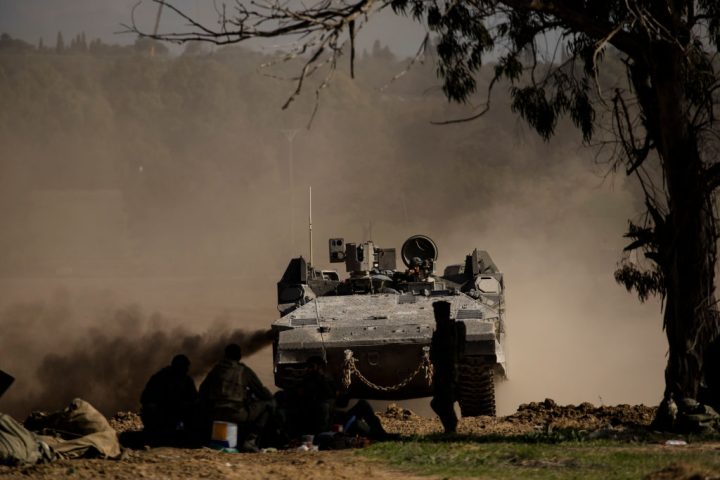Saleh al-Arouri may have been a senior member of the Palestinian group Hamas, but the drone strike that brought his story to an early close took place last night in Beirut, Lebanon. Pictures from the scene show a devastatingly precise hit, which also reportedly eliminated senior members of other factions.
The leaders of Hezbollah, the Lebanese terror group founded by Iran, will not have been surprised that Israel’s reach extends so easily into their country. Likewise, it will have been no surprise to Israel that al-Arouri and other Hamas officials were to be found in Beirut. Along with Qatar and Turkey, Lebanon has long been one of Hamas’s main bases outside Gaza, with influential figures like Osama Hamdan – whom as I type will no doubt be watching his back – making their homes there in the late Nineties.
Hamas, it seems, signed not just its own death warrant but also that of Hezbollah
But the killing of al-Arouri is significant as a place-marker. Security sources say that Israel will be unlikely to target Hamas operatives in places like Turkey at the moment, for fear of the diplomatic fallout. In Beirut, by contrast, no such hesitations apply. Let me put that another way: it is more likely than not that Israel will be at war with Hezbollah by the spring.
From Jerusalem’s point of view, it has little choice. 7 October signalled the death of ‘the concept’, an Israeli security doctrine developed by Benjamin Netanyahu that involved keeping a lid on the enemies across its borders while pursuing economic, technological and military development at home. Since 2007, when Hamas took over control of the Gaza strip and drove it into the ground, Israel’s economy has doubled. Iron Dome, the Jewish state’s cutting-edge missile defence system, first saw action in 2011. Despite the occasional skirmish, for all these years, both Hamas and Hezbollah have been seen as manageable threats.
Not any more. With its orgy of violence three months ago, Hamas signed its own death warrant. Overnight, the notion of maintaining the status quo seemed criminally naïve. The lesson was clear: if a terror group declared its intention to wipe you out and was developing the resources to do so, sooner or later it would make its move.
Hezbollah is a far more formidable foe than Hamas. With up to 150,000 missiles, many of them precision guided rockets, and up to 100,000 men, it dwarfs the Palestinian group in size and sophistication. It also benefits from a far closer relationship with Iran, which gave it life in 1982 and views it as a proxy. Many of its troops have become battle-hardened through fighting in Syria. I have walked inside the Hezbollah tunnels in the north of Israel which the IDF uncovered in 2019; in their ambition and technical accomplishment, they eclipsed those of Hamas. For months, tens of thousands of Israeli civilians from the north have been displaced by Hezbollah rocket fire, living in hotels further south at the government’s expense. How long can any country be expected to put up with such a threat without eliminating it?
Immediately after 7 October, the Americans had to dissuade Yoav Gallant, Israel’s defence minister, and the more hawkish members of the Israeli cabinet, from mounting a pre-emptive strike on Hezbollah in parallel with the operation in Gaza. But Israel cannot hold fire forever while its civilians live under such a shadow. Hamas, it seems, signed not just its own death warrant but also that of Hezbollah.
It also robbed the Lebanese terror group of the element of surprise. Before 7 October, blood-curdling rhetoric from both Gaza and Lebanon was taken with a pinch of salt by an Israeli leadership that had grown complacent on its own ‘qualitative military edge’. Israel, after all, was the regional superpower. If Hamas had not ploughed down the border fence and gone on its bestial rampage, Hezbollah would have been able to launch an even more devastating attack at the time of its choosing. Now its number is up.
At the beginning of the war in Gaza, Gallant set out three phases. First would come a full-scale invasion by ground and by air, to be followed by a smaller, counter-insurgency campaign to ‘eliminate pockets of resistance’. Finally, a new security reality in Gaza would be established, including a buffer zone along the frontier and complete dislocation from Israel. All the indications show that the second phase will arrive in January, and it will be smaller, more targeted and led by elite regular troops. Many reservists in Israel have received notice that they will be stood down this month, with at least two brigades, each comprising about 4,000 soldiers, due to withdraw this week.
A significant Israeli fighting force will continue to operate in the strip throughout this second phase, retaining the ability to engage in extensive and complex battles. But the footprint will be smaller and the campaign less kinetic. This approach, which will likely incur fewer civilian casualties and offer a degree of relief from diplomatic pressure from Washington, is likely to last many months. But it comes with a kicker: many reservists who are being stood down in January have been told they will be called up again by early spring. This could be the moment Hezbollah meets justice.
Washington has consistently been trying to reduce the chances of war with Hassan Nasrallah’s men. Its deployment of two aircraft carrier strike groups to the eastern Mediterranean immediately after 7 October was intended to deter serious attacks from the Lebanese militia and its Iranian backers (though the USS Gerald R Ford will reportedly return home in the coming days). From Israel’s point of view, however, the strategic imperative to eliminate the threat to the north remains so overwhelming that it verges on existential.
In recent weeks, Israeli officials and diplomats have been paving the way for a legitimate strike on the terrorists in Lebanon. There have been demands, for example, for the international community to push Hezbollah back from Israel’s border, in line with UN Security Council resolution 1701, passed at the end of the 2006 war, which banned armed factions south of Lebanon’s Litani River. The UN has neither the will nor the ability to do this, but it is the first step towards Israel setting up a credible campaign of self-defence.
On Saturday, Israel’s opposition leader Benny Gantz, who is viewed by many as a prime-minister-in-waiting, posted a message on X which went largely unnoticed. ‘For the sake of the security of Israel’s citizens and future regional stability – the threat of Hezbollah must be removed from Israel’s borders,’ he wrote. ‘The State of Israel cannot reconcile with such threat, and Germany together with the international community have an important role to play in ensuring such threat is removed.’
It couldn’t be clearer: Hezbollah is in Israel’s sights. His post then hinted at an even wider conflagration. ‘[The German chancellor and I] discussed the growing threat the Iranian-led Axis of Terror poses to global stability, particularly in the Red Sea and other places around the world,’ he wrote.
If it comes to pass, the campaign against Hezbollah will be tough. But if the new doctrine of eliminating credible threats is pursued, it may lead further still. As recent meddling of the Houthis has shown, Tehran is a major source of regional and global instability. Many Iranian assassinations attempts have been foiled on British soil. If the lesson of 7 October is that Hezbollah must be confronted as well as Hamas, the Iranians, with their fast-developing nuclear programme, may be next in line.
That prospect could easily spiral into the spectre of a global war. China, Russia and other autocracies may side with Iran against the democracies; last week, the UN’s nuclear weapons watchdog warned that under the cover of the Gaza war, Tehran had escalated its enrichment of uranium to 60 per cent purity, which is close to weapons grade. The dangers could not be more serious. But they are serious already, and right now Iran is dictating the timetable. As former Israeli leader Naftali Bennett put it, it is not enough to keep hacking at the tentacles of the octopus. You need to hit its head.
But that is for another day. For now, the clock is ticking loudly in Lebanon. Hezbollah knows this. Israel knows this. It only remains to be seen whether in this American election year, the Biden administration will be persuaded to support such a campaign or if Israel’s American credit only stretches so far.







Comments